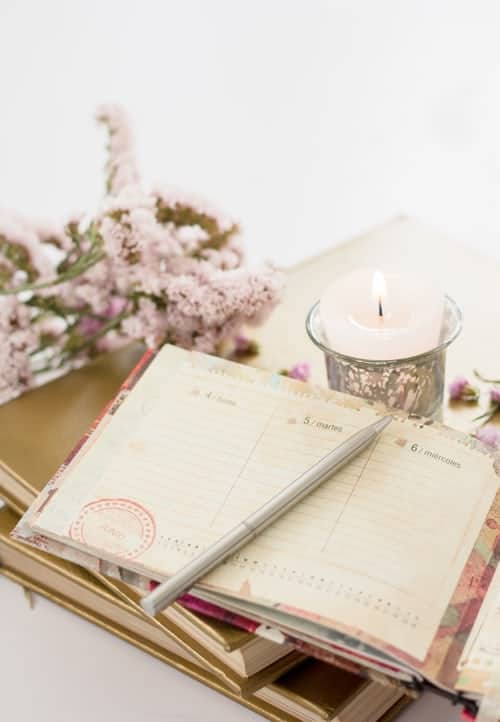11 Journaling Tips for Beginners
Journaling tips for beginners are super-important, if not crucial, to helping others start a journal habit.

Journaling has been nothing short of life-changing when it comes to my mindset.
However, when I first started, I didn’t have a CLUE what I was doing.
I kept spending tons of money on fancy journals that I’d write to-do lists in once or twice, and then they would end up in a drawer somewhere.
Now, I’ve managed to form a journal habit, which has helped me heal and grow in the process.
11 best journaling tips for beginners
In this blog post, I’m going to go over some of the most important journaling tips for beginners that I’ve personally come across (and used), as well as some extra tips on how to start.
#1. Get a journal you want to pick up
Journals don’t have to be expensive or flashy.
Over the years, I’ve learned that it’s the habit that stays, not necessarily the journal and if you want to write on a plain notepad, that’s totally up to you. Your journey is yours.
However, I do recommend getting a journal and stationary that you want to pick up.
As I said, it doesn’t need to cost the world – there are some adorable journals out there for <$10 – but having a journal that you actually feel called to write in is a great start.

#2. Use journal printables
I highly recommend using journal printables when you first start journaling.
Not only does printing out your journal pages and clipping them into a ring binder mean you save money on a physical journal, they also save you time as whatever you’re going to journal about it already mapped out on the page for you.
This takes out any guesswork or stress as you’re not sitting there trying to think of something to write. Someone has already done that for you. You just have to fill it in.
This is a great way to just get into the habit of writing in your journal every day without having to worry about what you’re doing.
I have some journal printables available on my Etsy shop, if you want to check them out.
#3. Choose journal prompts
One of the biggest journal tips for beginners that I can give you is to use journal prompts.
Why sit there trying to think of what on earth you’re supposed to write when you could simply pick a prompt and allow that to guide you?
Journal prompts are a productive way of writing about your feelings – positive and negative – and learning to open up on the page so that you can heal and grow from your experiences.
#4. Set an alarm or reminder to journal
If you find it hard to start a journal habit because you forget that you actually have to write in the thing, same.
The way I got around this was attach a reminder to my morning alarm so it was the first thing I saw – albeit through blurry eyes – first thing in the morning.
If you struggle with remembering to journal, I really recommend giving this a go.
#5. Set a timer
If you’re trapped for time and find yourself worrying about journaling for too long when you have things to do and places to be, simply set a timer.
Time yourself journaling for five – 10 minutes – however long you can spare – and stop when the timer goes off.
This way, you won’t be worrying about your journal practise running over.
This is also helpful even if you aren’t on a time limit if you tend to get distracted easily.

#7. Try to form a journal habit… but don’t beat yourself up for not journaling
Forming a journal habit does require a bit of discipline.
You have to be firm with yourself and do the damn thing.
When your phone reminds you to journal, you need to journal.
Don’t tell yourself you’ll just do it later because you can’t be bothered now, because more often than not, it won’t happen later either.
Forming a habit takes repeating it over and over again until it seamlessly becomes part of your routine. You barely have to think about it anymore, you just do – like brushing your teeth or making your bed.
On the flip side, if you do skip a day or two or even three, don’t sweat it.
Beating yourself up for not journaling isn’t productive or healthy for the mindset you’re trying to improve.
Remember: you’re journaling for yourself, not anyone else.
You’re not letting anyone down by not writing in your journal for a couple of days.
If you do miss a few days, I invite you to forgive yourself for being human, pick up your journal, and simply get back to it.
#8. Meditate after journaling
Meditating is a great way to round off the journal practise and clear your mind.
Journaling, particularly if you use your journal for shadow work, can be pretty tough at times.
It encourages you to face your demons, heal inner wounds, learn self discovery and grow.
This isn’t always a comfortable experience.
Meditating afterwards can really help clear that energy and punctuate your journal session.
You don’t need to meditate for long, either.
According to Headspace, frequency is much more important than length.

For example, meditating for only a few minutes everyday is going to be more beneficial to you than meditating for an hour here and there.
#9. Practise other types of self-care
A really positive journaling tip for beginners that I don’t see talked about anyone is practising self-care afterwards.
No matter how you’re feeling after writing in your journal, practising self-care is another way of drawing a line underneath your journal practise and continuing on with your day.
I’m not saying you have to have a bubble bath every time you write in your journal, but simply doing your skincare routine right afterwards, eating a nice breakfast, or sitting down with a nice coffee feels really good.
This not only helps smooth down any jagged edges poking out from your writing session, it also helps you form a positive association with journaling itself.
#10. Be open and honest when writing in your journal
The best way to get the most out of your journal practise and arguably the most important journaling tip for beginners that I know is to be open and honest when writing.
No one has to ever read what you’ve written – not even you.
You don’t need to worry about judgement or hurting anyone.
Simply vent and write what comes to mind.
Let your emotions fill you up and spill onto the page.
With openness and honesty comes accountability, healing and self discovery.
Calling yourself out, learning about what makes you tick as a person, and why you act the way you do in certain situations in your journal is a great way to learn and grow as a human being.

#11. Experiment with journaling practises – find what works for you
There are a ton of different journal practises out there aimed at helping improve your mindset.
However, you might find that not all of them are necessary or even helpful to you.
When you first starting journaling, it’s useful to experiment with different types of journal practise and find what works for you.
The journal practises that I’ve personally landed on are:
- Gratitude
- Goal/intention-setting
- Self-care scheduling
- Affirmations
- Journal prompts
All of these combined have helped transform my mindset and, by extension, mental health.
How do you start a beginner journal?
I have an entire post on how to start a journal, which you’ll find useful if you’re feeling a bit stuck.
However, the main takeaway I want to mention in this blog post is to just START.
If you’re a new to journaling and want to start journaling, order yourself a journal, notepad or printable now.
If you’ve already got one to hand, pick it up now, choose a journal prompt, and write for a few minutes.
Then do the same tomorrow.
How do I journal my thoughts?
While it’s very easy for me – a journal veteran – to tell you to ~just be open and honest~ when journaling, I do realise that this can be easier said than done.
Trust me, I’ve been there.
Facing our shadow traits head-on, writing about past experience that have shaped us positively or negatively, and spilling your feelings out onto the page of a notepad isn’t easy.
Many of us have been taught to keep our emotions under wraps, that admitting when we’re wrong somehow means acknowledging we’re a bad person (it really doesn’t), and toxic positivity (a.k.a. burying our heads in the sand in the name of positivity instead of facing our problems and learning from them).
Getting out of the habit of hiding our true feelings is tough.

However, it is possible.
The solution?
Again, this is where I come back to journal prompts as a solution, as they gently coax your true thoughts, feelings and emotions out of you in a concise way.
Using journal prompts really is the one of the best journaling tips for beginners that I’ve come across.
What should I journal about daily?
While I now journal about a range of things every morning, it’s taken me a while to get here.
If you’re new to journaling, what I really recommend is to pick only one or two journal practises to implement into your daily routine.
The two I would recommend that would make the most impact and get you into the habit of journaling the most affectively would be:
- Practising gratitude
- Journal prompts
Simply listing five things you’re grateful for each morning is amazing for a positive mindset, as it basically reprograms how we look at the world.
And using journal prompts, well, you already know how important I think that is to anyone who’s just starting a journal.
They quite literally prompt you into knowing what to write so that you have something new to write about every day.
If you choose to use printables, my printables include journal prompts so that you don’t have to find them separately.

A witchy ray of sunshine who loves to help others on their journal journey. I’ve been journaling since childhood and have since gone on to earn a degree in English and a diploma in Shadow Work. I love my plant babies, yoga, and anything spooky. Find out more on my about me page.
One Comment
Comments are closed.